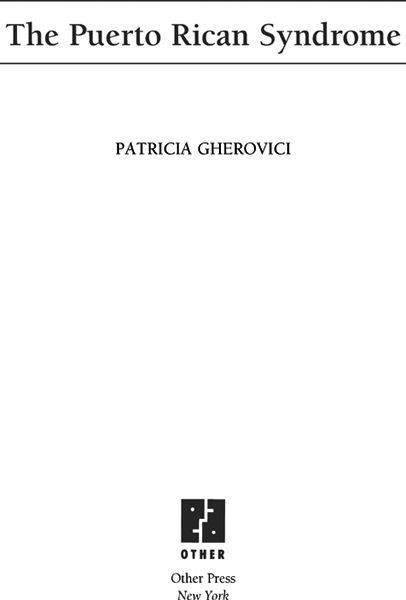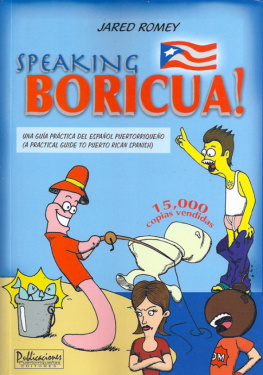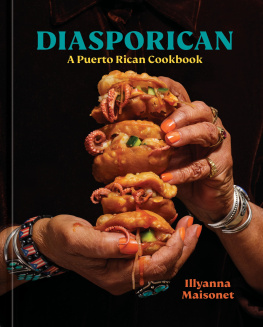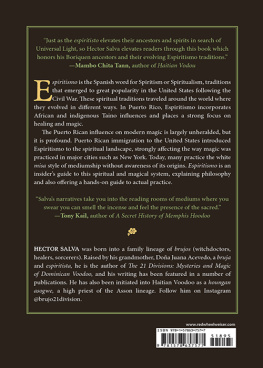Praise for Patricia Gherovicis
The Puerto Rican Syndrome
Patricia Gherovicis The Puerto Rican Syndrome rescues a suspect label from its racist trappings and turns it into a productive reading of the intricate relationship between history and hysteria; she unveils in what could have been dismissed as yet another case of reckless medication of impotence a powerful political narrative of cultural vindication. By reading the syndrome as a significant return of the largely forgotten psychoanalytic etiology of the hysteric, she enacts a retelling of a seizure as a formidable return of the living dead, where an ataque is not merely a passive reaction to stress, but a strategy, an attack, an act of warfare within the streets of welfare. To see hysteria as resistance is to recapture its Lacanian reading as a political questioning of authority and to effectively restate its power as the originating symptom of psychoanalysis. Gherovici cunningly places the Puerto Rican syndrome at the core of Freuds The Interpretation of Dreams by providing a careful reading of his dream of the Spanish-American War that sheds an unexpectedly larger light for the reading of transculturalism as discontent. In this age of facile crossovers and triumphant globalizations of ethnicity, this splendid book will be hard to swallow. It is in itself a powerful symptom for the most disturbing aspects of North American Latinization. There is, after all, a vida loca that really kicks ass.
Rubn Ros vila
Professor of Comparative Literature, University of Puerto Rico;
author of La raza cmica: del sujeto en Puerto Rico
Psychoanalysis is for the elite and hysteria does not exist? Well, just read Patricia Gherovicis book and you will discover why the elite has either never liked psychoanalysis or did not understand it. On top of that, youll meet a pur sang clinician who knows how to write as well.
Paul Verhaeghe, Ph.D.
Professor of Clinical Psychology, Department of Psychoanalysis,
University of Ghent, Belgium
In times of a significant increase in the number of Hispanics in the United States, it is worth reading The Puerto Rican Syndrome to understand how uncomfortable otherness and difference continue to be for the masters who prefer to pathologize whatever resists homogeneity and silence. Patricia Gherovicis book is an authoritative account on how the colonial other responds to such an attempt, giving an excellent example of how a psychoanalyst can take full responsibility for the human suffering she has been listening to. Gherovici provides powerful insights regarding such a listening in context that will be very useful to clinicians in various contexts as she explores the impact of colonialism and the place of the Hispanic Other in the United States political landscape.
Alfredo Carrasquillo-Ramrez
Psychoanalyst, San Juan, Puerto Rico
Associate Dean for Graduate Studies, University of the Sacred Heart, Puerto Rico
This groundbreaking study by Patricia Gherovici, a Lacanian psychoanalyst who works with Puerto Rican patients in Philadelphia, provides striking insights into a poorly understood form of hysteria known as the Puerto Rican syndrome, reveals the unique capacities of psychoanalysis to understand and treat the disorder, and in the process provides a fresh articulation of the basic assumptions and strategies of the talking cure. Through an impressive elucidation of the material, social, racial/ethnic, political, cultural, and discursive contexts in which psychological symptoms arise, Gherovici reveals how psychological symptoms and social symptoms interconstitute each other and demonstrates that solutions to problems in either domain must address both the social (and cultural, political, and material) and the psychological forces at play. This is a lesson that urgently needs to be learned by mental health workers, researchers in the human sciences, educators, and policymakers alike, and this book will help them learn it.
Mark Bracher
Editor, Psychoanalysis, Culture, & Society
Patricia Gherovicis The Puerto Rican Syndrome is a stunning book: at once a history of psychiatrys crypto-racism, it also offers decisive intervention in discussions of race and colonialism by showing the political situation at the heart of every hysterics demand for immediate justice or immediate protection.
Catherine Liu
Associate Professor, Department of Cultural Studies and Comparative Literature, University of Minnesota
Patricia Gherovicis book conjugates in a seminal manner the psychoanalytic, sociological, historical, and anthropological discourses in a way that is destined to change American psychiatric discourse. The consequences of her courageous writing will be felt not only in theory and clinical psychoanalysis but in the political field because we witness a concrete denunciation of the mechanism of racism and domination. It is no hyperbole to call this book an essential work.
Nestor Braunstein, Director of the Masters Program in Psychoanalysis at the Universidad del Claustro de Sor Juana, Mexico
A short circuit occurs when two currents to be kept apart meet, thus producing an explosive disturbance of the system. Gherovicis book is such a short circuit, bringing together Lacanian psychoanalysis at the highest conceptual level and the concrete experience of social work among Puerto Ricans in Philadelphia. The result is breathtaking: the proof that top theory and engaged social experience need each other. A must for everyone, especially the anemic Cultural Studies academics!
Slavoj iek, philosopher and psychoanalyst
Patricia Gherovici in her outstanding book explains how a culturally labeled mental illness, like Puerto Rican syndrome, in a particular way reflects the political, gender, and class divides in todays American society. Never since Freuds Civilization and Its Discontents have we encountered such profound understanding of the link between the individuals malaise and the malaise of the civilization. Gherovicis book has to be a must read not only for every psychotherapist working with a multi-ethnic population, but also for anyone who wants to understand how traumas of immigration create new types of neurotic symptoms.
Renata Salecl, Centennial Professor at London School of Economics, author of ( Per ) versions of Love and Hate
C ULTURAL S TUDIES
A series of books edited by Samir Dayal
Crisis of the European Subject
Julia Kristeva
Three Mothers, Three Daughters:
Palestinian Womens Stories
Michael Gorkin and Rafiqa Othman
Sunlight and Shadow:
The Jewish Experience of Islam
Lucien Gubbay
Textures of Time:
Writing History in South India 16001800
Velcheru Narayana Rao, David Shulman,
and Sanjay Subrahmanyam
The Puerto Rican Syndrome
Patricia Gherovici
Contents
Acknowledgments
M any people have helped me with this book. I feel grateful for the friendship and generous input of Flavia Gutirrez, Nicols Buosoo, Pablo Meninato, and Roxana Vogler. I will never forget that the informal meetings of our reading group soon became officially the Philadelphia Lacan Study Group in 1990. Their encouragement back then was instrumental in launching my research on the Puerto Rican syndrome.











